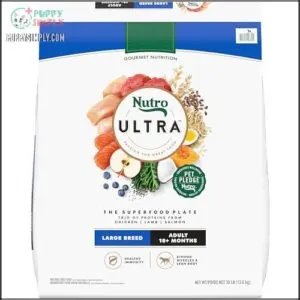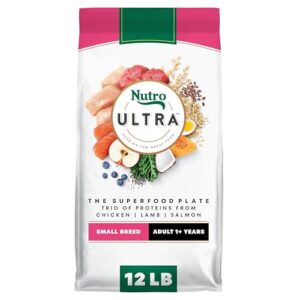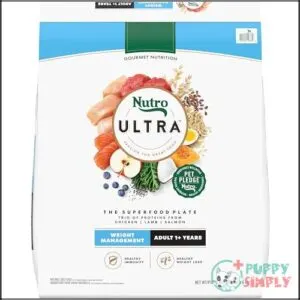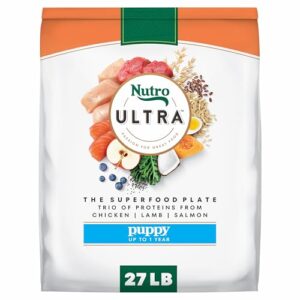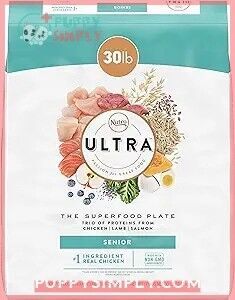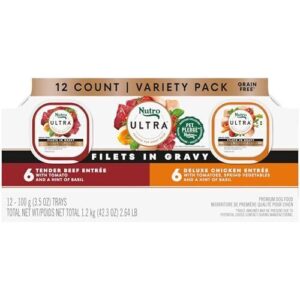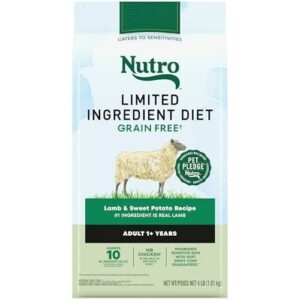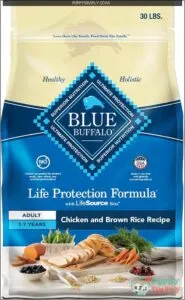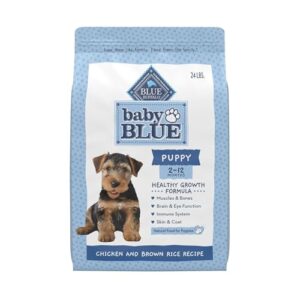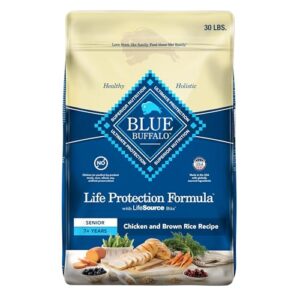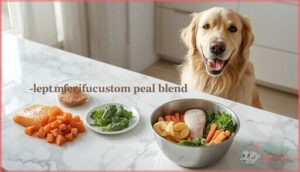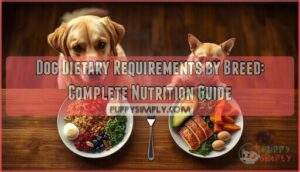This site is supported by our readers. We may earn a commission, at no cost to you, if you purchase through links.
Your dog’s bowl holds one of the most important health decisions you’ll make as a pet owner. Yet walk down any pet store aisle and you’ll face hundreds of brands making bold promises—grain-free, ancestral diets, vet-recommended formulas, superfood blends. The marketing is loud, but the science behind quality nutrition is surprisingly straightforward.
Dogs need complete proteins, balanced fats, essential vitamins, and minerals that meet AAFCO standards, not trendy ingredients or flashy packaging. Understanding what separates genuinely nutritious food from expensive kibble with good branding can add years to your dog’s life and save you from costly health issues down the road.
Table Of Contents
- Key Takeaways
- Best Dog Food Brands for 2026
- Top 10 Dog Food Products Reviewed
- 1. Nutro Ultra Large Breed Dog Food
- 2. Nutro Ultra Small Breed Dog Food
- 3. Nutro Ultra Weight Management Dog Food
- 4. Nutro Ultra Puppy Food
- 5. Nutro Ultra Senior Dog Food
- 6. Nutro Ultra Wet Dog Food
- 7. Nutro Limited Ingredient Dog Food
- 8. Blue Buffalo Adult Dog Food
- 9. Blue Buffalo Puppy Food
- 10. Blue Buffalo Senior Dog Food
- Key Factors in Choosing Dog Food
- Dog Food Types and Their Benefits
- Nutritional and Safety Considerations
- Frequently Asked Questions (FAQs)
- Conclusion
Key Takeaways
- Choose dog food brands that invest in veterinary nutritionist-backed formulas, AAFCO feeding trials, and transparent manufacturing practices rather than relying on marketing claims about trendy ingredients like grain-free or superfood blends.
- Match your dog’s food to their specific life stage (puppy, adult, senior), breed size, and health conditions since nutritional requirements for protein, calcium-to-phosphorus ratios, and joint support compounds vary dramatically across these categories.
- Prioritize brands using named protein sources (chicken, beef, lamb) as the first ingredient with complete amino acid profiles, while avoiding vague terms like “meat meal” and verifying the guaranteed analysis shows adequate nutrient density and bioavailability.
- Transition any new food gradually over 7-10 days using incremental mixing ratios to prevent digestive upset, and monitor your dog’s response through stool consistency, coat condition, and energy levels rather than assuming one formula works universally.
Best Dog Food Brands for 2026
Not all dog food brands are created equal. The best brands earn their reputation through consistent quality control, investment in nutritional research, and transparency about their manufacturing processes.
For owners seeking quality without overspending, this guide to the best food for small dog breeds highlights brands that prioritize recipe integrity and proven manufacturing standards.
Here’s what sets the top-performing brands apart from the rest.
What Makes a Brand The Best
Quality control and customer trust define what makes a dog food brand the best. You’ll want vet-recommended formulas backed by veterinary nutritionist expertise, consistent pet health and nutrition standards, and transparent dog food ingredients.
Strong market presence paired with brand loyalty signals that a company delivers on its promises. Brand reputation isn’t just marketing—it reflects real results your dog can thrive on.
Importance of Brand Reputation
When you’re scanning pet food brands at the store, reputation tells you which companies consistently deliver safe, nutritious formulas. Veterinary recommendations from sources like PetMD and board-certified veterinary nutritionists carry weight—they won’t stake their reputation on subpar pet food brands.
Customer trust drives brand loyalty because owners see real health improvements in their dogs.
Consumer confidence grows when companies practice strong reputation management and corporate ethics through transparent recalls and quality testing.
Science-Backed Formulas and Clinical Trials
But reputation alone won’t keep your dog healthy—you need formulas grounded in real science research. Look for brands that run clinical trials and veterinary testing to measure digestibility, palatability, and nutrient profiling against AAFCO standards.
Formula development guided by a veterinary nutritionist ensures each recipe meets canine dietary needs and animal nutrition guidelines, making vet-recommended products worth the investment.
Top 10 Dog Food Products Reviewed
After reviewing the top brands, it’s time to look at specific products that deliver on quality and nutrition.
We’ve selected ten formulas from Nutro Ultra and Blue Buffalo that meet AAFCO standards and address different life stages and needs.
Here’s what you need to know about each option.
1. Nutro Ultra Large Breed Dog Food
If you’re feeding a large breed dog, you need to think about more than just filling the bowl. Nutro Ultra Large Breed combines chicken, lamb, and salmon with 15 superfoods like chia seeds and kale to support muscle development and joint health.
The formula includes glucosamine and chondroitin—two compounds that help cushion those big joints. With 23 percent protein and whole grains for sustained energy, it’s designed to meet the higher caloric needs of active, larger dogs without unnecessary fillers.
| Best For | Owners of large breed dogs who want a protein-rich formula with joint support and are willing to invest in premium ingredients. |
|---|---|
| Brand | Nutro |
| Age Range | Adult |
| Form | Dry Kibble |
| Weight | 30 Pounds |
| Primary Protein | Chicken, Lamb, Salmon |
| Grain-Free | No |
| Additional Features |
|
- Triple protein blend (chicken, lamb, salmon) plus 15 superfoods supports strong muscles and overall health
- Contains glucosamine and chondroitin to protect joints in heavy, active dogs
- No corn, wheat, soy, or chicken by-products—just real meat and whole grains
- Higher price point compared to standard large breed formulas
- High vegetable content might not appeal to all owners or dogs with sensitivities
- Results can vary based on individual dog’s digestive system and health needs
2. Nutro Ultra Small Breed Dog Food
Small dogs pack a lot of energy into those tiny bodies, and Nutro Ultra Small Breed delivers protein from chicken, lamb, and salmon to fuel lean muscle without overloading their fast metabolisms. The kibble is sized for smaller mouths, making it easier to chew and digest.
You’ll also find omega fatty acids for coat shine and beet pulp to support gut health. With antioxidant-rich blueberries and cranberries, this formula promotes immune function—essential for keeping your pint-sized companion healthy and vibrant.
| Best For | Small breed adult dogs who need high-quality protein to maintain lean muscle and energy, especially those who benefit from omega fatty acids for coat health and antioxidants for immune support. |
|---|---|
| Brand | Nutro |
| Age Range | Adult |
| Form | Dry Kibble |
| Weight | 12 lb |
| Primary Protein | Chicken, Lamb, Salmon |
| Grain-Free | No |
| Additional Features |
|
- Three animal proteins (chicken, lamb, salmon) provide complete nutrition for active small dogs
- Omega 3 & 6 fatty acids promote healthy skin and a shiny coat
- Contains 14 superfoods with antioxidants to support immune health
- Higher price point compared to many other small breed dog foods
- Bag lacks a resealable zip closure, making storage less convenient
- Some customers have received incorrect formulas (toy breed instead of small breed)
3. Nutro Ultra Weight Management Dog Food
If your dog’s carrying extra pounds, Nutro Ultra Weight Management tailors protein and fat to support healthy weight loss without sacrificing nutrition. The trio of chicken, lamb, and salmon delivers complementary amino acids to maintain lean muscle while you reduce calories.
With protein around 25% and fat near 10-13%, this formula keeps energy steady. You’ll also find glucosamine and chondroitin for joint support—essential when excess weight stresses mobility.
Omega fatty acids promote coat health, and the superfood blend includes antioxidant-rich blueberries and kale for immune function.
| Best For | Adult dogs who need to lose weight without losing muscle, especially those with joint stress from carrying extra pounds. |
|---|---|
| Brand | Nutro |
| Age Range | Adult |
| Form | Dry Kibble |
| Weight | 30 Pounds |
| Primary Protein | Chicken, Lamb, Salmon |
| Grain-Free | No |
| Additional Features |
|
- Three high-quality proteins (chicken, lamb, salmon) maintain lean muscle during weight loss while delivering complete amino acids
- Includes glucosamine and chondroitin to support joints under stress from excess weight
- Omega fatty acids and superfood blend (blueberries, kale) promote healthy coat and immune function
- Priced at $86.99 for 30 pounds, making it one of the more expensive weight management options
- Requires strict portion control to actually achieve weight loss results
- May not work for dogs with specific protein allergies or sensitivities to chicken, lamb, or salmon
4. Nutro Ultra Puppy Food
Young puppies need more than just calories—they need the right building blocks for rapid growth. Nutro Ultra Puppy Food blends chicken, lamb, and salmon to deliver complementary amino acids that support lean muscle development. DHA from natural sources promotes brain and vision development during those vital early months, while glucosamine and chondroitin from the animal meals protect developing joints.
The balanced calcium-to-phosphorus ratio ensures healthy bone growth without over-supplementation. With omega 3 and 6 fatty acids plus antioxidant-rich superfoods, you’re covering immune function and coat health in one formula.
| Best For | Puppy owners who want premium nutrition with multiple protein sources and are willing to pay extra for high-quality ingredients without fillers. |
|---|---|
| Brand | Nutro |
| Age Range | Puppy |
| Form | Dry Kibble |
| Weight | 27 Pounds |
| Primary Protein | Chicken, Lamb, Salmon |
| Grain-Free | No |
| Additional Features |
|
- Triple protein blend (chicken, lamb, salmon) provides complete amino acids for muscle and brain development
- Includes DHA for cognitive growth plus omega fatty acids for healthy skin and coat
- No corn, wheat, soy, or by-products—just real ingredients and 14 superfoods
- Higher price point compared to standard puppy foods
- Some buyers report strong odor from the kibble
- Occasional delivery problems and may not work for puppies with very specific dietary restrictions
5. Nutro Ultra Senior Dog Food
As your dog ages, muscle preservation becomes the priority—not just maintaining weight. Nutro Ultra Senior Dog Food leads with real chicken and adds lamb and salmon to deliver complete protein profiles that help protect lean mass.
You’ll find glucosamine and chondroitin supporting joint comfort, while antioxidants from 15 superfoods like blueberries and kale reinforce immune function.
The balanced vitamin E and zinc levels target cellular health, and whole grains like brown rice provide gentle, digestible energy without taxing aging digestive systems.
| Best For | Senior dogs needing joint support and muscle maintenance through a protein-rich formula with real meat sources. |
|---|---|
| Brand | Nutro |
| Age Range | Senior |
| Form | Dry Kibble |
| Weight | 30 Pounds |
| Primary Protein | Chicken, Lamb, Salmon |
| Grain-Free | No |
| Additional Features |
|
- Triple protein blend from chicken, lamb, and salmon helps preserve lean muscle mass as dogs age
- Glucosamine and chondroitin provide natural joint support for improved mobility
- 15 superfoods deliver antioxidants that strengthen immune function without artificial additives
- Premium ingredients come with a higher price tag than standard senior dog foods
- Kibble may be too hard for some senior dogs with dental issues
- Needs slow transition period to avoid digestive upset when switching from other foods
6. Nutro Ultra Wet Dog Food
When your dog turns up their nose at kibble, moisture-rich options can reignite their appetite. Nutro Ultra Wet Dog Food delivers triple-protein formulas—chicken, lamb, and fish—in both smooth pate and chunky filet-in-gravy formats.
Each 3.5-ounce tray provides around 900-1000 kcal per kilogram with minimum 8% crude protein and high moisture content (75-78%) to support hydration. You’ll find added vegetables like spinach and kale plus omega-rich flaxseed.
These complete meals work as stand-alone dinners or kibble toppers for finicky eaters.
| Best For | Adult dogs who are picky eaters or need extra hydration, especially those who prefer wet food over dry kibble. |
|---|---|
| Brand | Nutro |
| Age Range | Adult |
| Form | Wet |
| Weight | 3.5 oz trays |
| Primary Protein | Beef & Chicken |
| Grain-Free | Yes |
| Additional Features |
|
- Real beef or chicken as the first ingredient with no artificial flavors, colors, or preservatives
- Triple-protein formula with high moisture content (75-78%) supports hydration and digestive health
- Versatile use as a complete meal, treat, or kibble topper for finicky eaters
- May be expensive compared to other wet food options
- Limited to adult dogs only, not suitable for puppies or seniors
- Some dogs may not enjoy the taste, and trace artificial ingredients may be present due to cross-contact during manufacturing
7. Nutro Limited Ingredient Dog Food
When allergies or sensitive stomachs disrupt your dog’s routine, simplicity becomes your strongest ally. Nutro Limited Ingredient Diet builds each recipe around a single protein—lamb, turkey, or venison—paired with just ten ingredients or fewer to minimize digestive triggers.
You’ll get 26-30% protein for muscle maintenance with easily digestible carbohydrates like brown rice. The formula excludes wheat, corn, soy, and dairy while adding omega fatty acids from fish oil and flaxseed for skin health. Available in both grain-inclusive and grain-free options.
| Best For | Dogs with food sensitivities or allergies who need a simplified diet with a single protein source and minimal ingredients. |
|---|---|
| Brand | Nutro |
| Age Range | Adult |
| Form | Dry Kibble |
| Weight | 4 lbs |
| Primary Protein | Lamb |
| Grain-Free | No |
| Additional Features |
|
- Simple formula with 10 or fewer ingredients makes it easy to identify and avoid allergens
- High protein content (26-30%) supports muscle health while omega fatty acids promote healthy skin and coat
- Available in both grain-inclusive and grain-free options to accommodate different dietary needs
- Higher price point at $27.98 for 4 lbs compared to standard dog food brands
- Potential cross-contamination during manufacturing may still trigger reactions in highly sensitive dogs
- Customer reports of inconsistent availability and occasional shipping issues
8. Blue Buffalo Adult Dog Food
Blue Buffalo Life Protection Formula features real deboned chicken as the first ingredient, delivering mid-twenties protein on a dry matter basis to support muscle maintenance in your adult dog. The recipe excludes chicken by-products, corn, wheat, and soy while incorporating omega-3s and omega-6s from fish meal and flaxseed for coat health. Larger breeds benefit from added glucosamine and chondroitin for joint support.
You’ll notice LifeSource Bits—those darker kibble pieces—which pack antioxidants like vitamins C and E to support immune function.
| Best For | Dog owners looking for a natural, protein-rich food with real chicken and immune-supporting antioxidants for their adult dogs. |
|---|---|
| Brand | Blue Buffalo |
| Age Range | Adult |
| Form | Granule |
| Weight | 30.28 Pounds |
| Primary Protein | Chicken |
| Grain-Free | No |
| Additional Features |
|
- Real deboned chicken as the first ingredient with no by-products, corn, wheat, or soy
- LifeSource Bits provide antioxidants and immune system support
- Includes omega fatty acids for healthy skin and coat plus glucosamine for joint health
- More expensive than many competing brands
- Large kibble size may not work for all dogs
- Some reports of shipping delays and backorders on Amazon
9. Blue Buffalo Puppy Food
Puppies need higher protein and customized calcium-to-phosphorus ratios to fuel rapid growth, and this formula delivers. Real deboned chicken leads the ingredient list, providing the amino acids your pup needs for muscle development.
DHA aids brain and eye maturation during those critical first months, while LifeSource Bits add immune-boosting antioxidants. The kibble size fits smaller mouths comfortably, and the recipe avoids chicken by-products, corn, wheat, and soy.
Shift gradually over seven to ten days to prevent digestive upset.
| Best For | Puppy owners looking for a high-quality food with real chicken, DHA for brain development, and no fillers like corn, wheat, or soy. |
|---|---|
| Brand | Blue Buffalo |
| Age Range | Puppy |
| Form | Dry |
| Weight | 24 lb |
| Primary Protein | Chicken |
| Grain-Free | No |
| Additional Features |
|
- Real deboned chicken as the first ingredient supports healthy muscle growth
- DHA and ARA promote cognitive and retinal development during critical early months
- LifeSource Bits provide antioxidant support for developing immune systems
- Higher price point at $53.98 for a 24-lb bag compared to budget brands
- Requires careful portion control to prevent overfeeding and weight gain
- Not suitable for adult dogs or puppies with special dietary restrictions
10. Blue Buffalo Senior Dog Food
As your dog ages, joint support becomes as important as nutrition itself. This formula pairs real chicken with added glucosamine and chondroitin to help maintain cartilage and mobility.
LifeSource Bits deliver antioxidants that combat oxidative stress in older dogs, while easily digestible protein maintains muscle mass without taxing the gut.
The kibble size accommodates sensitive teeth, and the recipe skips common allergens like corn, wheat, and soy. It’s available in 5-, 15-, and 30-pound bags to match your senior’s appetite.
| Best For | Senior dogs needing joint support and immune system reinforcement, especially those with sensitive stomachs or allergies to common grains. |
|---|---|
| Brand | Blue Buffalo |
| Age Range | Senior |
| Form | Granule |
| Weight | 30.28 Pounds |
| Primary Protein | Chicken |
| Grain-Free | No |
| Additional Features |
|
- Real chicken plus glucosamine and chondroitin help aging joints stay mobile and comfortable
- LifeSource Bits pack in antioxidants to strengthen immune systems that naturally weaken with age
- Skips corn, wheat, soy, and poultry by-products, making it gentler on sensitive digestive systems
- Costs more than many senior dog food brands, which adds up over time
- Some dogs won’t eat it due to kibble texture or flavor preferences
- Switching foods requires a slow transition period to avoid upsetting your dog’s stomach
Key Factors in Choosing Dog Food
Picking the right dog food isn’t as simple as grabbing the first bag off the shelf. Your dog’s age, size, and health needs all play a role in finding the best match.
Here are the main factors you should consider before making your decision.
Life Stage and Breed Considerations
Your dog’s nutritional needs shift dramatically as they move through Growth Phases—from energy-dense Puppy Nutrition in the first year to calorie-controlled Senior Care in later life. Each Life Stage demands specific canine dietary needs.
Breed Size matters too: small dog breeds need more calories per pound, while large breeds require controlled calcium to protect developing joints. Matching Puppy Food or Senior Dog Food to your pet’s current stage prevents obesity and developmental issues.
Understanding how these influence nutrition can further support peak health throughout your dog’s life.
Ingredient Quality and Nutritional Value
Quality labels showcase named protein sources—chicken, beef, lamb—rather than vague “meat meal,” ensuring your pet receives complete amino acid profiles.
Check the guaranteed analysis for nutrient density: minimum crude protein and fat percentages reveal bioavailability factors that matter for absorption.
Ingredient transparency means reading beyond marketing claims—descending weight order tells you what’s really inside, meeting nutritional requirements your dog actually needs.
AAFCO Nutritional Standards
AAFCO establishes model animal nutrition guidelines that set baseline nutrient profiles for dog food, covering protein, fat, essential minerals, and vitamins your pet needs.
Brands demonstrate Label Compliance through Feeding Trials or laboratory analysis, with standardization process updates reflecting current veterinary care science.
Look for statements confirming the product is “complete and balanced” for your dog’s life stage—that’s your regulatory oversight safety net.
You can learn more about the standards in these AAFCO dog food nutrient profiles.
Veterinary Recommendations
Your trusted clinic partner can steer you toward brands with solid veterinary care track records and vet-reviewed formulas. Veterinary recommendations often highlight companies investing in clinical trials, pet nutrition research, and dog wellness outcomes.
Vet endorsements signal transparent ingredient sourcing and consistent quality control. Veterinary guidance during wellness visits helps you match a diet to your dog’s unique health profile, ensuring every bowl promotes long-term vitality.
Dog Food Types and Their Benefits
You’ve got more choices than ever regarding feeding your dog, and each type brings its own advantages. From traditional kibble to fresh-prepared meals, the format you choose can affect everything from your dog’s dental health to how well they stay hydrated.
Let’s break down the main options so you can figure out what works best for your dog’s needs and your daily routine.
Dry Kibble
Most dry dog food earns vet-recommended status because it’s convenient and complete. Kibble ingredients are cooked under high heat, creating that crunchy texture your dog enjoys while keeping moisture under 12 percent for extended shelf life.
This process aids nutrient retention through careful vitamin fortification, and AAFCO-compliant brands like Hill’s Science Diet guarantee you’re feeding a balanced diet every day.
Wet and Canned Food
Wet and canned food delivers 75 to 80 percent moisture content, making it ideal for hydration support and palatability factors that appeal to picky eaters. This vet-recommended dog food option benefits senior dogs and those with dental issues due to its soft texture.
The canned nutrition aids canine health through higher animal-based ingredients, though pet nutrition experts emphasize pairing wet food benefits with proper dental care for peak dog health and wellness.
Fresh and Customized Diets
Fresh dog food offers individualized nutrition through specific meal plans that adjust protein, carbs, and micronutrients to your dog’s weight, age, and activity level. These specific feeding strategies use fresh ingredient sourcing to deliver nutrient optimization that mass-produced kibble can’t match.
Your dog diet benefits from real-time adjustments based on veterinary recommendations, ensuring specific diets support everything from allergies to joint health.
Grain-Free and Limited Ingredient Options
Grain-free diets benefit dogs with sensitive stomachs by replacing barley and corn with sweet potatoes or peas. Limited ingredient diets use a single protein source, such as venison or duck, to help identify food sensitivities.
These novel proteins support digestive health through simplified formulas—think one carbohydrate, one protein—making allergen tracking straightforward when your dog’s gut needs extra support.
Nutritional and Safety Considerations
Your dog’s nutrition isn’t just about what’s in the bowl—it’s about what keeps them healthy and safe for years to come. Understanding the nutrients your dog needs, recognizing potential safety risks, and knowing when special diets matter can make all the difference in their wellbeing.
Here’s what you need to know to feed your dog with confidence.
Essential Nutrients for Dogs
Your dog’s body relies on five core nutrients to thrive: animal protein delivers essential amino acids like leucine and lysine for muscle health, while fats—especially omega-3 and omega-6 fatty acids—fuel energy and support skin condition.
Dogs need five core nutrients to thrive: protein for muscle, fats for energy and skin, vitamin D for bones, minerals for balance, and water for hydration
Vitamin D strengthens bones, minerals like calcium maintain proper mineral balance, and fresh water regulates hydration levels.
Quality dog food nutrition means getting all these pieces right.
Food Safety and Contaminant Risks
Even trusted brands can face contamination—bacterial risks like listeria and salmonella, chemical residues, or physical debris can slip through. Recent testing found listeria in four samples, though aflatoxins stayed well below FDA limits. Your safeguard? Choose manufacturers with:
- HACCP-based safety protocols
- Routine contaminant testing
- Third-party certifications
- Transparent food recall histories
- Lot-level ingredient tracking
These measures minimize Dog Food Safety risks before your pup’s bowl.
Special Diets for Health Conditions
When kidney disease, diabetes, or food allergies surface, your dog’s dietary needs shift dramatically. Kidney care formulas cut phosphorus and sodium to ease organ strain. Obesity management plans blend high fiber with calorie control. Digestive health diets feature easily absorbed proteins and soluble fiber for IBS relief. Heart health foods lower sodium and boost omega-3s, directly addressing cardiovascular concerns through nutrition.
How to Transition to a New Food
Over seven to ten days, mix old and new dog food using gradual switching ratios—start with three parts old to one part new, then shift to equal amounts, and finally reverse the ratio. This shift approach protects digestive health and minimizes food sensitivities while maintaining nutrient balance.
Monitor stool consistency daily, and consult your vet-recommended professional if signs of intolerance appear during your dog food selection process.
Frequently Asked Questions (FAQs)
How often should I feed my dog daily?
Most healthy adult dogs thrive on two meals daily, spaced twelve hours apart. Puppies, however, require three to four smaller portions to support their steady growth. Breed size and individual health conditions may also influence your dog’s ideal feeding schedule.
What are signs of food allergies in dogs?
Watch for persistent itching, red or inflamed skin on paws and face, recurrent ear infections, chronic diarrhea, vomiting after meals, and excessive licking—common dog allergies and sensitivities requiring veterinary recommendations.
Should puppies and adults eat the same food?
A golden retriever puppy wolfing down its older sibling’s bowl might seem harmless, but puppy nutrition demands higher protein, calcium, and DHA than adult diets.
Switching prematurely risks developmental setbacks your veterinarian wouldn’t recommend.
How long does opened dog food stay fresh?
Opened dry dog food stays fresh for 6 to 8 weeks when stored in an airtight container in a cool, dry place. Refrigerate opened wet food and use within 3 to 4 days.
Conclusion
Your dog’s bowl doesn’t need to become a source of worry or second-guessing. Armed with the right information about AAFCO standards, ingredient quality, and life-stage requirements, you can confidently select from the best dog food brands that prioritize nutrition over marketing hype.
Trust veterinary guidance, watch how your dog responds, and remember that consistent, science-backed feeding builds the foundation for a longer, healthier life together.
- https://www.aafco.org/
- https://www.akc.org/expert-advice/nutrition/best-dog-food-choosing-whats-right-for-your-dog/
- https://www.fda.gov/animal-veterinary/outbreaks-and-advisories/fda-investigation-potential-link-between-certain-diets-and-canine-dilated-cardiomyopathy
- https://www.petmd.com/dog/vet-verified/best-dry-dog-food
- https://www.whole-dog-journal.com/food/whats-the-best-dry-dog-food/


